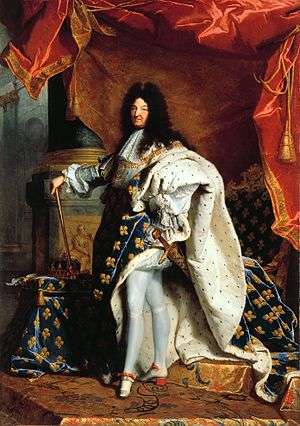Absolute monarchy in France

Absolute monarchy in France slowly emerged in the 16th century and became firmly established during the 17th century. Absolute monarchy is a variation of the governmental form of monarchy in which all governmental power and responsibility emanates from and is centered in the monarch. In France, Louis XIV was the most famous exemplar of absolute monarchy, with his court central to French political and cultural life during his reign. He lent absolute monarchy in France its most famous quotation: "L'État, c'est moi!".
Introduction
The 16th century was strongly influenced by religious conflicts[1] developing out of the establishment of Lutheranism and permanent wars. However, France’s critical position turned out to be of a central meaning for the formation and theoretical justification of absolute monarchy. Its disputes between monarchy and community as well as the fatal loss of the House of Valois'[2] authority during the second half of the 16th century prompted nation-state theoretical reflections that led to a strengthening of the monarchic central power, so helped to overcome the monarchy’s crisis and to consolidate the internal and external political situation.
Establishing Absolute Monarchy In France
By the early 9th century, the efficient administration of Charlemagne's Empire was ensured by high-level civil servants, carrying the, then non-hereditary, titles of counts (in charge of a County), marquis (in charge of a March), dukes (military commanders), etc. During the course of the 9th and 10th centuries, continually threatened by Viking invasions, France became a very decentralised state: the nobility's titles and lands became hereditary, and the authority of the king became more religious than secular and thus was less effective and constantly challenged by powerful noblemen. Thus was established feudalism in France. Over time, some of the king's vassals would grow so powerful that they often posed a threat to the king.
Since then, French kings had continuously tried to strengthen existing royal powers scattered among their nobles. Philip the Fair, Charles the Wise and Louis the Cunning were instrumental in the transformation of France from a feudal state to a modern country. By the time of Francis I, France was a very centralized state but the French Wars of Religion posed a new threat to royal absolutism with quasi-independent Protestant strongholds developing in various locations in the country.
With his skilful Prime Minister Richelieu, who vowed "to make the royal power supreme in France and France supreme in Europe." (source: Cardinal Richelieu's Political Testament), Louis XIII established Absolute Monarchy in France during his reign. When his son and successor Louis XIV came to power, a period of trouble known as the Fronde occurred in France, taking advantage of Louis XIV's minority. This rebellion was driven by the great feudal lords and sovereign courts as a reaction to the rise of royal power in France.
The rebellion was crushed; however, many obstacles stood in the way of absolutism in France:
- Nobles had the means to raise private armies and build fortifications. The king did not have the means to raise and keep an army himself and had to rely on these nobles to defend the nation;
- Lesser nobles, who had the ability to read and write, also acted as the king's agents. Effectively, they were his representatives of government to the people. They collected taxes, posted edicts, and administered justice.
- The Huguenots, who since the 1598 Edict of Nantes by Henry IV, held the rights to bear arms and to build fortifications in certain locations.

To overcome these obstacles King Louis XIV adopted several measures to weaken or eliminate competing centers of power:
The Edict of Fontainebleau in 1685 removed the former policy of tolerance to French Huguenot, as formalized by the Edict of Nantes
A more subtle tactic was the demolition of a number of fortified castles still owned and occupied by members of the nobility. This Edict of 1626 was justified as a budgetary reform to reduce maintenance costs by removing obsolete fortifications within the borders of France. While a rational economic step in itself, this measure did have the additional effect of undermining the independence of the aristocracy.
Louis XIV reduced the nobles’ power further by requiring them to spend at least some portion of the year as courtiers in residence at the Versailles. At Versailles, the aristocracy were removed from their provincial power centers and came under the surveillance and control of the royal government. Rather than seen as demeaning, the nobles took required membership of the royal court to be a high honor. Nobles, being granted residence at Versailles, were generally prepared to give up their former duties as royal representatives outside Paris. Louis XIV, with the help of his minister of finance, Jean-Baptiste Colbert, replaced them with royal appointees drawn largely from the merchant class, who were generally better educated and whose titles were revocable and not hereditary.
Consequences
The final outcome of these acts did centralize the authority of France behind the king. The replacement of government ministers, removal of castles, and other financial polices of Colbert did reduce French national debt considerably. In the 18th century, however, the relocation of nobles and the sheer obsolescence of Versailles became an important place for a rising merchant class and an instigative press.
Perhaps the most pressing consequence of absolutism in France is the emigration of the Huguenots. Of the merchant class, their emigration effectively leads to a brain drain and a loss of tax revenue for France. Moreover, barred from New France, they immigrated to other nations, most notably the 13 colonies, taking their skills of printing, glass making, carpentry, ceramics, a deep belief in the needs for freedom of religion (at least for Protestantism), and the right to bear arms.
See also
References
- ↑ "Sixteenth Century". Lepg.org. Retrieved 2012-10-19.
- ↑ "France History, The French Valois Dynasty 1358-1589". Bonjourlafrance.com. Retrieved 2012-10-19.